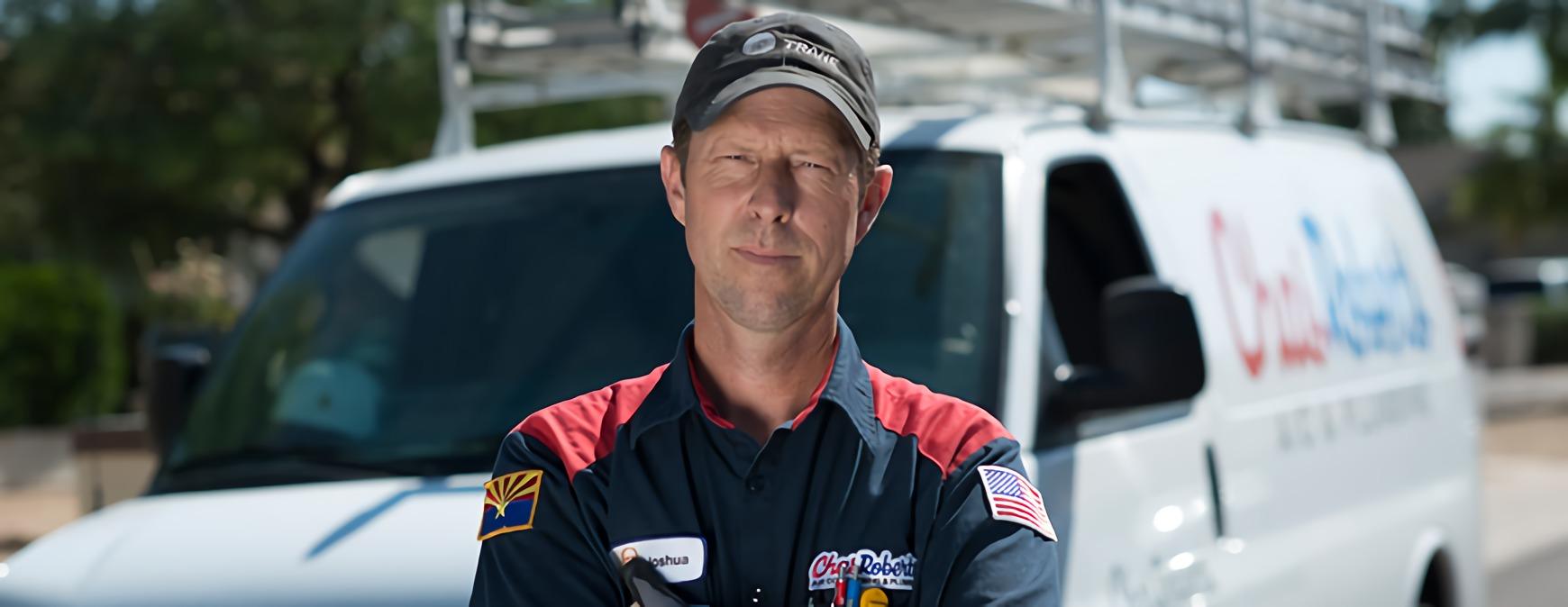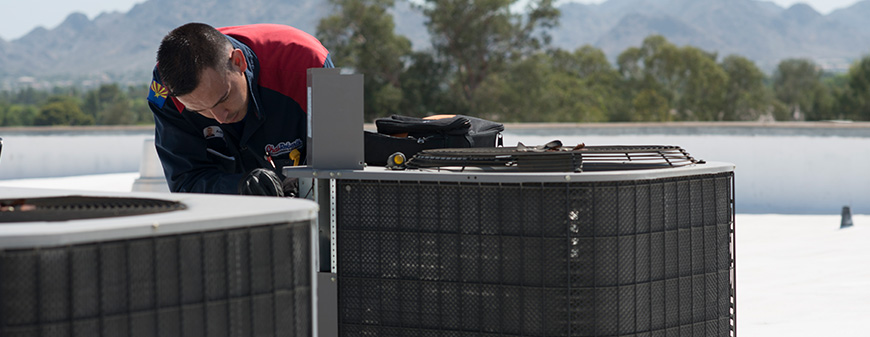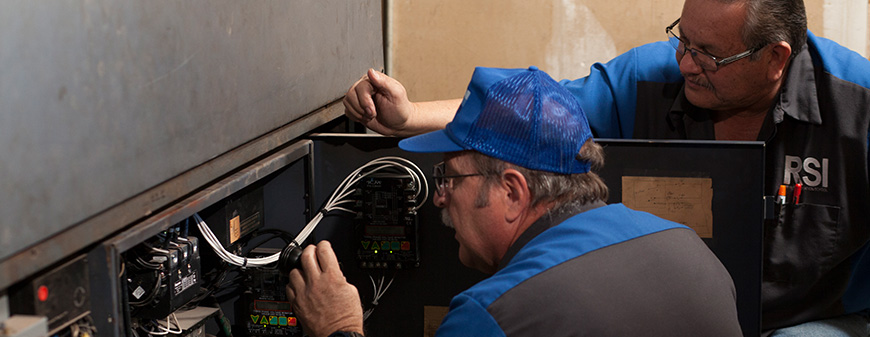
Where could your HVAC training take you after graduation? Considering how important indoor climate control and air quality is in most homes, stores, office buildings, schools, hospitals and factories, just about anywhere.[1]
If you’re leaning toward a career in commercial HVAC service, you might want to take a closer look at these last three work settings.
In this article, we’ll share insights into the role of HVAC in one them: schools. Here’s what you should know about this sector of the industry.
The Goal for HVAC Systems in Schools

The primary role of heating, ventilation and air conditioning equipment in schools is the regulation of temperature and indoor air quality.[2] These systems are responsible for keeping educators, staff and students a comfortable temperature and to minimize their exposure to pollutants in the air.[3]
Get Started on the Path to a New Career
Fill out our form to learn how we can help you change your life.
A healthy school environment promotes student learning and productivity in the classroom, improving their achievements and performance throughout their lives.[4]
Similar to in homes and buildings, HVAC systems are among the top consumers of energy in schools.[5] Consequently, energy efficiency is a goal many schools have for their HVAC systems. Two other objectives are reducing water consumption and promoting desirable listening conditions for students and teachers.[6][7]
The State of HVAC Systems in Schools

While the goal of HVAC systems in schools is to efficiently keep students and staff comfortable and healthy, the reality is that this may not be the case for the 53 million children and 6 million adults spending their days in our more than 120,000 private and public-school buildings. This is because many of these structures are old, in need of repair and may even be exposing occupants to environmental hazards like carbon monoxide or mold.[8]
In fact, the U.S. Green Building Council Center for Green Schools found that many of the nation’s schools are in disrepair. In its 2013 State of Our Schools report, the organization indicated it would require $542 billion to bring schools into compliance with current safety, health and education standards.[9]
This presents a huge opportunity for HVAC technicians. Many are already helping to construct schools geared toward resource conservation and energy efficiency. Many more will be needed to upgrade equipment in older schools.
“Bringing HVAC systems in schools up to date will be a key part of improving student health and performance,” said Rachel Gutter, the director of the Center for Green Schools.
Facts & Stats about HVAC in Schools
- About 50 percent of our country’s schools have problems related to indoor air quality.
- Children are more susceptible to indoor pollutants.[10]
- Students start to learn less when the temperature surpasses 70 degrees. The hotter the classroom, the worse the conditions for learning.[11]
- Energy is the highest school-related expense for states besides staff.
- Schools that make energy efficiency improvements typically slash utility bills by 5 to 20 percent.[12]
What HVAC Techs Need to Know about Servicing Schools

It’s clear many schools are in need of HVAC updates and even more are being built with energy efficiency in mind, but what are some of the ins and outs of working in the school sector?
Competitiveness
Schools can be big jobs, but landing them can be competitive. You’ll likely be bidding alongside other contractors for the work.[13]
Cost
Schools are budget-conscious customers. The price tag on upgrades or renovations can be a deal-breaker.[14]
Deadlines
Schools tend to schedule work when students are off for the summer and have hard deadlines. Prepare to work long hours and weekends during the busy summer season to finish the job on time. Make sure you have enough staff before signing up for school projects.[15]
Clearance to Work Near Students
If you’ll be working when school is in session, you and your employees will need clearance to work near students.[16]
HVAC Equipment
The HVAC systems in schools require complex design decisions. HVAC technicians should strike a balance between the following factors when selecting equipment for a school:
- Cost
- Heating and cooling needs
- Indoor air quality
- Energy efficiency
- Humidity control
- Outdoor air quality and quantity
- Natural ventilation potential
- Codes and standards[17]
Indoor Air Quality
- Conduct regular maintenance on the school’s ventilation system.
- Place carbon monoxide detectors near boilers, hot water heaters and other combustion sources.
- Regularly clean or replace HVAC air filters.
- Adhere to ASHRAE 60.1’s improved ventilation requirements.[18]
- Follow the guidelines in the Ensure Good Ventilation component of the EPA’s program for environmental health in schools.[19]
Energy Efficiency
- Use Energy Star’s Portfolio Manager to identify the energy use baseline for the school.
- Survey the school’s rooms to determine where energy upgrades can be made.
- Advise staff and students to follow best practices, such as keeping doors closed, vents clear and electronics and lights off when not in use.
Keeping Students Healthy with HVAC Service
The school sector not only offers work opportunities for HVAC technicians but also the satisfaction of knowing their services facilitate learning environments for our nation’s students.
But, as is the case with other sectors, there are important considerations for HVAC professionals in schools. Knowing them can help techs make informed decisions about entering and working in this market.
Schools are just one of the many areas HVAC technicians ply their trade in. Learn about other different work settings.
Additional Sources
[1] https://www.bls.gov/ooh/installation-maintenance-and-repair/heating-air-conditioning-and-refrigeration-mechanics-and-installers.htm#tab-3
[2] https://www.epa.gov/iaq-schools/heating-ventilation-and-air-conditioning-systems-part-indoor-air-quality-design-tools
[3] https://www.epa.gov/sites/production/files/2014-05/documents/sensible_steps.pdf
[4] https://www.epa.gov/sites/production/files/2014-05/documents/sensible_steps.pdf
[5] https://science.howstuffworks.com/environmental/green-tech/sustainable/5-energy-hungry-appliances4.htm
[6] https://www.epa.gov/iaq-schools/heating-ventilation-and-air-conditioning-systems-part-indoor-air-quality-design-tools
[7] https://www.epa.gov/iaq-schools/links-related-indoor-air-quality-schools#Acoustics
[8] https://www.epa.gov/sites/production/files/2014-05/documents/sensible_steps.pdf
[9] https://kapost-files-prod.s3.amazonaws.com/published/56f02c3d626415b792000008/2016-state-of-our-schools-report.pdf?kui=wo7vkgV0wW0LGSjxek0N5A
[10] https://www.epa.gov/schools-air-water-quality/healthy-schools-and-indoor-air-quality
[11] http://blogs.edweek.org/edweek/inside-school-research/2018/05/temperature_climbs_test_scores_drop.html
[12] https://www.epa.gov/schools-healthy-buildings/facility-and-efficiency-improvements-concerning-energy-efficiency-healthy
[13] https://www.achrnews.com/articles/133681-schools-ready-to-invest-in-efficiency-iaq
[14] https://www.achrnews.com/articles/133681-schools-ready-to-invest-in-efficiency-iaq
[15] https://www.achrnews.com/articles/140280-three-tips-for-hvac-contractors-taking-on-the-school-market
[16] https://www.achrnews.com/articles/140280-three-tips-for-hvac-contractors-taking-on-the-school-market
[17] https://www.epa.gov/iaq-schools/heating-ventilation-and-air-conditioning-systems-part-indoor-air-quality-design-tools
[18] https://www.achrnews.com/articles/133681-schools-ready-to-invest-in-efficiency-iaq
[19] https://www.epa.gov/schools-air-water-quality/healthy-schools-and-indoor-air-quality
This blog has been labeled as archived as it may no longer contain the most up-to-date data. For a list of all current blog posts, please visit our blog homepage at https://www.rsi.edu/blog/

